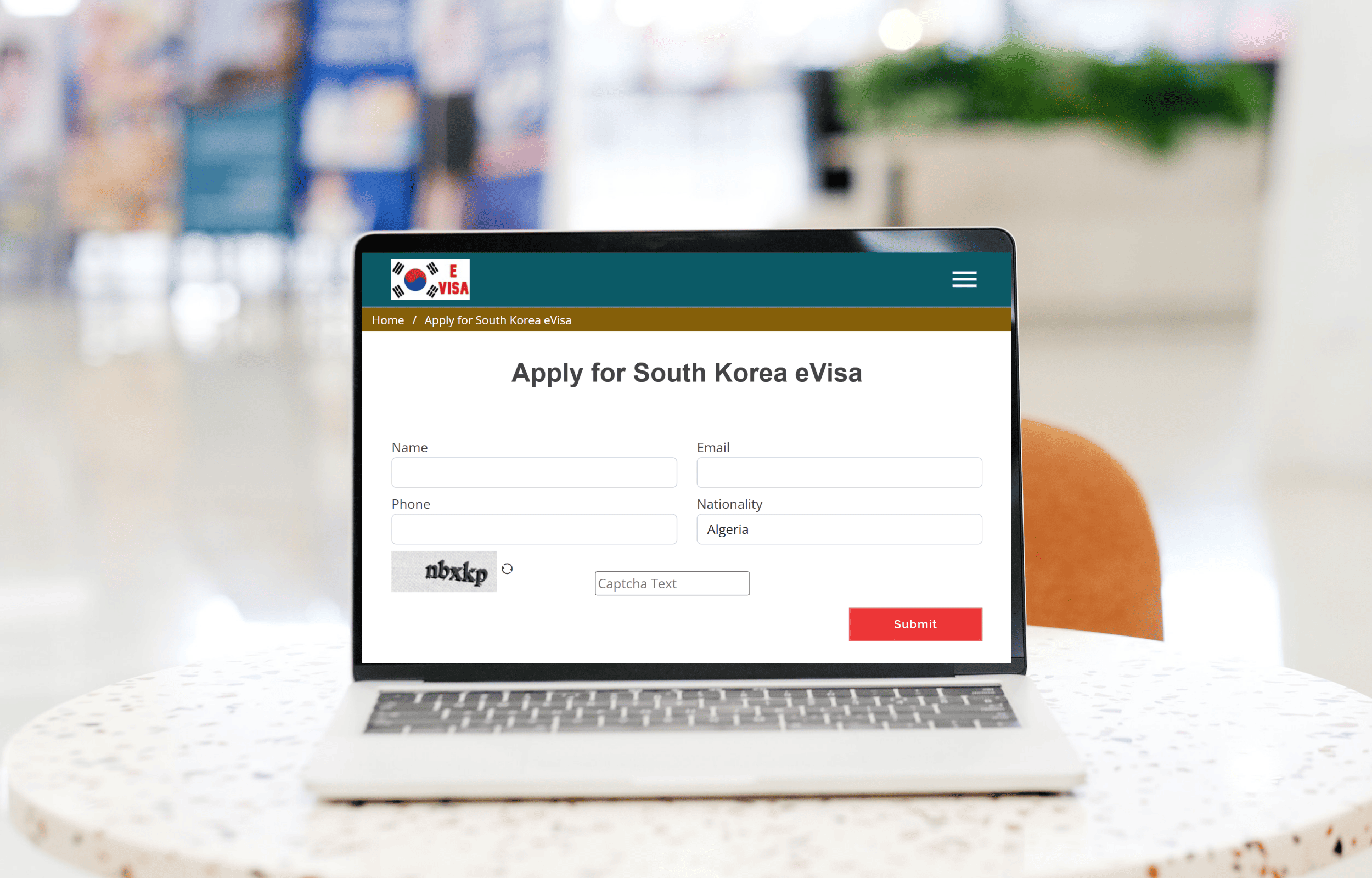The Korea Electronic Travel Authorization (KETA) is specifically designed for nationals of countries that are already eTA-exempt for short stays in South Korea. This means that travelers from these countries do not need to apply for a traditional eTA for tourism, business, or short-term visits, provided they meet certain conditions.
K-ETA Application Process: A Quick Guide

The Korea Electronic Travel Authorization (K-ETA) is required for eTA-free travelers entering South Korea. This online system streamlines entry by approving travelers before departure. Here’s how to apply:
Check Eligibility
K-ETA is available for travelers from eligible countries visiting for tourism, business, or short-term stays. Check the official K-ETA website to confirm your eligibility.
Prepare Required Information
Ensure you have a valid passport, a recent passport-size photo, and travel details (flight and accommodation information). Your passport must be valid for at least six months.
Apply Online
Visit the official K-ETA website or use the mobile app. Fill out the application form with accurate personal and travel details.
Pay the Application Fee
A non-refundable fee is required, payable online via credit or debit card.
Receive Approval & Travel
Most applications are processed within 24–72 hours. Once approved, your K-ETA is valid for multiple entries for up to 2 years. Print or save a copy of your approval to present upon arrival.
Exempted Countries (K-ETA Requirement Waived)
The government has temporarily exempted nationals from 22 countries and regions from the requirement to obtain a Korea Electronic Travel Authorization (K-ETA) for entry into South Korea. This exemption is part of the 'Visit Korea Year' initiative, aimed at promoting tourism. The exemption period has been extended until December 31, 2025.
- Dominica
- Guam
- Hong Kong
- Macau
- Morocco
- Serbia
- United Kingdom
Countries Eligible for K-ETA
Travelers from certain countries and regions who are eligible for eTA exemption to South Korea must apply for the South Korea Electronic Travel Authorization (KETA) before entering the country. This online application system is designed to streamline the entry process and ensure that travelers meet all necessary requirements. Below is a list of countries and regions eligible for KETA, who are required to apply for it to enter South Korea:
Countries That Must Apply for a eTA at the Embassy
Citizens from the following countries are not eligible for the K-ETA and must apply for a tourist eTA directly at a South Korean embassy or consulate before traveling:
- Abkhazia
- Aland Islands
- Algeria
- American Samoa
- Angola
- Anguilla
- Antarctica
- Armenia
- Aruba
- Azerbaijan
- Bangladesh
- Belarus
- Belize
- Benin
- Bermuda
- Bhutan
- Bolivia
- Bonaire
- Bouvet Island
- British Indian Ocean Territory
- British Virgin Islands
- Burkina Faso
- Burundi
- Cambodia
- Cameroon
- Cape Verde
- Cayman Islands
- Chad
- Christmas Island
- Cocos (Keeling) Islands
- Comoros
- Congo, Democratic Republic of the
- Cook Islands
- Cote d'Ivoire
- Curacao
- Djibouti
- Egypt
- Equatorial Guinea
- Ethiopia
- Falkland Islands (Islas Malvinas)
- Faroe Islands
- French Guiana
- French Polynesia
- French Southern Territories
- Gabon
- Gambia
- Georgia
- Ghana
- Gibraltar
- Greenland
- Guadeloupe
- Guernsey
- Guinea
- Guinea-Bissau
- Heard Island and McDonald Islands
- India
- Indonesia
- Isle of Man
- Jersey
- Jordan
- Kenya
- Kosovo
- Kyrgyzstan
- Laos
- Lebanon
- Liberia
- Macedonia, Republic of
- Madagascar
- Malawi
- Maldives
- Martinique
- Mauritania
- Mayotte
- Moldova
- Mongolia
- Montserrat
- Mozambique
- Myanmar
- Nagorno-Karabakh
- Namibia
- Nepal
- Niger
- Nigeria
- Niue
- Norfolk Island
- Northern Cyprus
- Northern Mariana Islands
- Papua New Guinea
- Philippines
- Pitcairn
- Puerto Rico
- Reunion
- Rwanda
- Sahrawi Arab Democratic Republic
- Saint Barthelemy
- Saint Helena, Ascension and Tristan da Cunha
- Saint Martin
- Saint Pierre and Miquelon
- Sao Tome and Principe
- Senegal
- Sierra Leone
- Sint Maarten
- South Georgia and the South Sandwich Islands
- South Ossetia
- Sri Lanka
- Svalbard and Jan Mayen
- Tajikistan
- Tanzania
- Timor-Leste
- Togo
- Tokelau
- Transnistria
- Turkmenistan
- Turks and Caicos Islands
- US Virgin Islands
- Uganda
- United States Minor Outlying Islands
- Vanuatu
- Vietnam
- Wallis and Futuna
- Western Sahara
- Zambia
- Zimbabwe
South Korea K-ETA Validity

Once approved, the Korea Electronic Travel Authorization (K-ETA) is generally valid for two years or until the expiration of the passport used for the application, whichever comes first. During this period, travelers can make multiple visits to South Korea for short stays (up to 90 days per visit) without needing to reapply for K-ETA.
It's important to ensure that the K-ETA remains valid before planning any travel to South Korea. If the K-ETA expires or the passport is renewed, a new application will be required.
K-ETA Application Fees: An Overview
The application for the Korea Electronic Travel Authorization (K-ETA) involves a nominal fee, which can be paid online via credit card or other digital payment methods. It’s advisable to check the official K-ETA website for the most up-to-date information on the application fee.
Benefits of KETA for eTA-Exempt Travelers
For citizens of eTA-exempt countries, applying for the Korea Electronic Travel Authorization (KETA) provides several advantages:
- Simplified Application: Apply online from anywhere, without the need for embassy visits.
- Faster Entry: Skip traditional eTA processes and enjoy quicker immigration clearance.
- Convenience for Short Stays: Ideal for stays of up to 90 days for tourism, business, or family visits.
- No Traditional eTA: KETA eliminates the need for a standard eTA, reducing paperwork.
- Security Screening: Ensures only low-risk travelers are approved for entry.
- Cost-Effective: KETA is more affordable than traditional eTA applications.
- Multiple Entries: KETA often allows multiple entries within its validity period.
- Flexibility: Provides greater flexibility for travel without reapplying for a eTA each time.
Frequently Asked Questions
Nationals from countries such as the United States, Canada, the United Kingdom, Australia, Japan, Taiwan, and several European nations are eligible for K-ETA, meaning they do not need a traditional eTA to enter South Korea for short stays.
Yes, citizens of eTA-exempt countries are required to apply for K-ETA before traveling to South Korea for tourism, business, or short-term visits. It simplifies the entry process and helps with border security.
eTA exemption allows citizens from certain countries to enter South Korea without a eTA for short stays. However, K-ETA is an additional requirement for eTA-exempt travelers to gain entry without the need for a eTA, offering an easier and quicker entry process.
As of now, there are no blanket exceptions for nationals of eTA-exempt countries. However, specific travelers such as those holding diplomatic passports or certain government officials may have different entry requirements.
If you are from a eTA-exempt country and fail to apply for K-ETA, you may be denied entry to South Korea. It is crucial to apply for K-ETA before your trip to avoid any delays or complications upon arrival.
Disclaimer: Although this information was last updated in July 2025, we recommend verifying with the appropriate agencies, embassies, and airlines to ensure complete accuracy regarding your travel plans.


To help us improve